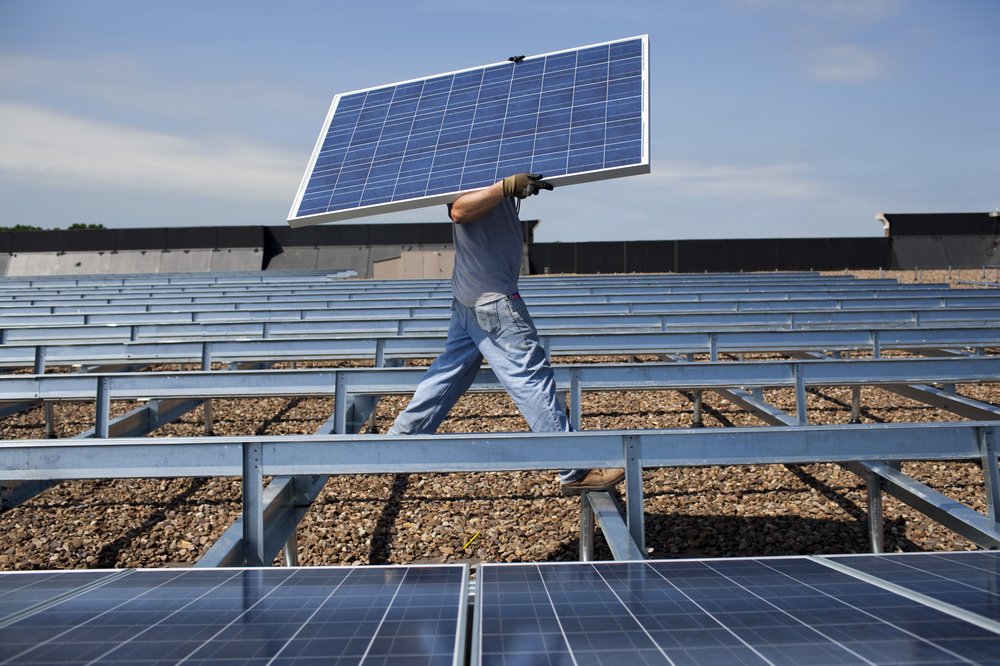NJ lawmakers advance legislation to get more renters, lower-income residents solar power
June 13, 2025, 2:28 p.m.
The bill would increase the state’s community solar program by 50%. Lawmakers behind the legislation hoping to sign it into law this month.

More than 210,000 New Jersey homes and businesses have gone solar to cut down on rising utility bills — but not everyone has easy access to the money-saving energy option.
Solar can be costly to install on a home, some roofs aren’t big enough provide enough power and renters have to rely on their landlords to install those sun-loving panels.
New Jersey lawmakers advanced legislation this week aimed at knocking down some of those barriers.
New Jersey and other states have established community solar programs to help residents – particularly low- and middle-income earners – take advantage of solar by tapping into systems installed on nearby roofs or in fields.
On Thursday, state lawmakers voted legislation out of committee that would increase the capacity of the state’s program by 50%.
Sen. Vin Gopal, author of the Senate bill, said that if it's passed, the legislation would increase the community solar program’s capacity from 2 gigawatts to 3 gigawatts as early as August 2025. The total is enough to power 519,000 homes, according to the Solar Energy Industry Association.
Gopal said the legislation can work as a hedge against overall rising rates in New Jersey, which have increased on average by 20% this month and are expected to spike even more in the coming years.
“ We need more generation and we need it quickly,” he told Gothamist. ”Community solar projects are the quickest way to get electrons on the grid locally and, at the same time, provide savings to middle-class and low-income families.”
He added that the state’s expansion will help counter some of the Trump administration's proposed cuts to clean energy programs.
How does it work?
New Jersey’s community solar initiative started in 2018 as a pilot program before it was made permanent in 2023. According to the state Board of Public Utilities, which regulates power generation in New Jersey, community solar currently provides energy for more than 28,000 homes and has saved its users more than $7 million since the program began.
It works on a subscription basis.
“Think of it as kind of like a Sam's Club for solar,” said Doug O’Malley, director of the advocacy group Environment New Jersey.
New Jerseyans can enter their ZIP code into the BPU website to find out if community solar is already an option in their area. O’Malley said “hundreds” of slots are still available right now, even without the proposed expansion.
Under the statute, the program is required to provide at least a 15% savings to subscribers.
“Some of the [savings] are as high as 40% for the community solar customers,” said Drew Tompkins, director of advocacy and policy for the Jersey Renews Coalition.
The statute also requires that at least 51% of the subscribers are lower- and middle-income households, Tompkins said.
Hedge against rate increases, Trump cuts
Starting this month, New Jersey utility payers' monthly bills increased $20 on average.
PJM, which runs the energy marketplace for more than a dozen states including New Jersey, broke the news to utility payers earlier this year, saying it needed to raise rates due to future demand for energy outstripping supply.
Gov. Phil Murphy and clean energy advocates have pushed back and placed the onus on PJM, claiming it mismanaged the energy generation process and has been too slow to bring new energy projects online. PJM has long been criticized for throwing up barriers to clean energy in New Jersey.
Just last week, Murphy touted the community solar program's success and called for further expansion.
Meanwhile, President Donald Trump and House Republicans in Washington are championing a spending bill that would drastically cut tax incentives for solar. The legislation comes on the heels of an executive order from Trump freezing permitting for offshore wind energy projects, which has effectively killed new projects on the Jersey Shore.
”With the Trump administration's position … we need to look at other types of renewable resources,” Gopal said.
Gopal told Gothamist he was hoping to get bipartisan support for the legislation to increase the state’s community solar program. But all Republican members of both the Senate Environment and Energy and Assembly Telecommunications and Utilities committees either abstained or voted against the bills Thursday. The legislation still passed both committees easily – 3-1 in the Senate and 5-1 in the Assembly.
The community solar bill will now head to the floor for a vote from the full state Senate and Assembly. Gopal said he is hoping that they can get it passed and sent to Murphy’s desk by the end of the month.
NJ electric bills are about to jump 20% — who's to blame and what can you do? Gov. Murphy calls on lawmakers to strengthen NJ's clean energy goals in his final year in office